Awesome Alliance Indo-German Strategic Partnership

The broad-based reforms carried out by the Indian Government, inviting more European countries and companies to invest in India, highlights India’s efforts to boost economic recoveries. Especially with regards to Germany, there’s a lot that unites India and Germany, besides being leading economies.
India and Germany have marked 70 years of diplomatic relations in 2021. As per recent reports, Germany is India’s largest trading partner in Europe. More than 1,700 German companies are based in India, providing four lakh direct and indirect jobs. Bilateral trade between the two nations in 2021–22 was $24.84 billion.
To understand the importance that India attaches to its ties with Germany, Dr Jürgen Morhard, outgoing German Consul General in Mumbai and his spouse, Petra Morhard and Martin Schwenk, MD & CEO, Mercedes-Benz India Pvt Ltd, provide a deep economical, social and cultural perspectives
Business in India is deep and running!
"I am blessed to have come here from Germany because business with India is deep and running for more than a century. Pune is a special place and we consider Pune as the home of the German hub"
-Dr Jürgen Morhard
Dr Jürgen Morhard, the outgoing German Consul General in Mumbai, provides an insight into the deep Indo-German connection, be it in business or education. He was speaking at a FICCI FLO event held on the expansive premises of the Mercedes-Benz plant in Pimpri-Chinchwad, Pune
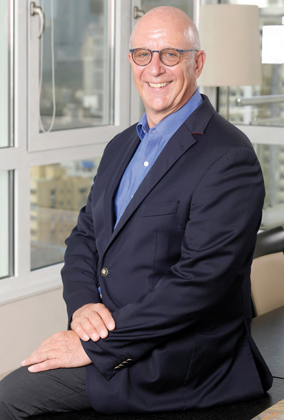
Business in India is deep and running!
“In our increasingly globalised and interconnected world, it is more important than ever to leave behind narrow-minded and short-sighted perspectives and to embrace an open and global mindset. Particularly when it comes to matters of business, economics, and education,” stated Dr Jüergen Morhard, Consul General of Germany in Mumbai (who recently completed his tenure in India) at an event to mark the 25th anniversary of the Indo-German Training Centre in Mumbai.
Similar structures
The affable Morhard who has enjoyed every bit of India experience says, “Like FICCI in India, which also has an office in Berlin, Germany, is structured similarly since we believe a lot in self-organisations. We too have different channels of commerce which are instrumental in increasing and intensifying bilateral economic activities between the two countries. Just as FICCI is helping Indian companies to grow, Germany is also trying to promote the Indo-German Chamber of Commerce which is one of the largest here in India.” Called as AHK Indien, it is a catalyst for the promotion of trade and industrial relations between India and Germany.
"Maharashtra is ranked No.1 in attracting FDI from Germany to India in the last 20 years. The State has been open to all investments and because of many academic institutions, we get labour, skilled processes in the engineering and the IT sector and when there is a group of investors which is happy, that’s the best promotion you can make"
- Dr Jürgen Morhard,
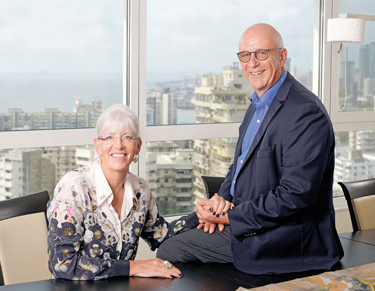 We love India: Petra and Dr Jürgen Morhard
We love India: Petra and Dr Jürgen Morhard
Century-old ties
Elaborating on the historic Indo-German connection through education and enterprise, Morhard stated proudly, “I am blessed to have come here from Germany because business with India is deep and running for more than a century. Our office in Mumbai opened in 1856. Pune is a special place because that is where German as a language was taught over 105 years ago at the New English School and Fergusson College. We also consider Pune as the home of the German hub, which started with so many German learners, and German teachers and now, of course, we have German industries here. It is where more than 40 per cent of German investment goes to Maharashtra and most of it goes to the Pune area-not only Mercedes, Volkswagen and Škoda but there are many other companies you probably are not aware of because they are a part of the supply chain to these automobile giants.”
Indeed, Pune has more than 190 wholly-owned German companies, 175-odd German Joint Ventures, and 80-odd companies that mainly do business with Germany, as per the MIDC report based on information from the Ministry of External Affairs.
Maharashtra is the biggest and the most attractive investment destination in India with robust policies, mature infrastructure and skilled manpower. The State is ranked No.1 in attracting FDI from Germany to India in the last 20 years and 20% of German companies in India are in Pune alone, as per NITI Aayog State Statistics. Reflecting this, Morhard states, “Maharashtra has been open to all investments and because of many academic institutions, we get labour, skilled processes in the engineering and the IT sector and when there is a group of investors which is happy, that’s the best promotion you can make.”
Long-term investments
A new trend, says Morhard, is that German entrepreneurs and professionals are already looking forward to shifting to India from Germany. Nonetheless, German companies have always had a long tenure in India. “A company like Siemens, which has been here since 1871, and many others that are here for a long time. If a German company makes an investment, I always say, it is not for a brief period, but for a marathon run because our companies are owned mostly by family businesses. They do not look for quarter-to-quarter results but long-term perspectives and thus, they are much more committed to the investments they are making. For me, it has been a blessing here because everything is just moving forward. Of course, there are hiccups along the road, and India could develop much faster, but if you look around the world where there is a much similar market, similar large open society, equal playing field, and fair judiciary, then it’s India.”
As per the report in https://india.diplo.de/, “In recent times, the success story continues as both countries extend their business relationship. Thereby, India as one of the fastest-growing economies in the world offers various opportunities for German companies. Today, more than 1700 German companies are active in India, providing around 400,000 direct and indirect jobs. Germany is India’s largest trading partner in Europe and among India’s top ten global trade partners. Bilateral trade between Germany and India in 2016 was valued at more than EUR 17.4 billion.
Edu attractions
On the education front too, the interest in education, particularly for professional degrees like engineering, has grown. States Morhard proudly, “All of a sudden, Europe has gained tremendous attraction for students. I am very happy to see that there is a spike in Indian students going to Germany for engineering degrees.”
At least 330,000 international students are currently enrolled at German universities, according to a snapshot survey by the German Academic Exchange Service (DAAD). The number of international first semester students has also grown again despite the Covid-19 pandemic and, according to DAAD projections, stands presently at around 72,000.
According to studyinternational.com, the number of Indian students in Germany continues to be on the rise. The latest figures released by the Federal Statistical Office of Germany revealed that the number of Indian students in Germany has grown by 20.85% over the last year and stands at 25,149 (Winter Semester 2019-20), significantly surpassing the overall growth rate of international students.
So long, farewell, I hate to say goodbye...
Petra Morhard, wife of Dr Jürgen Morhard, the outgoing German Consul General in Mumbai, is in love with India for the warmth of the Indian people and for all things that keep moving despite the chaos!
"Just the hospitality and warmth, and wherever you go, people smile-that is so amazing. In some other countries it is very difficult to get eye-to-eye contact, but in India, it is so easy. It is the most lasting thing that I take home"
- Petra Morhard,
Corporate Citizen: You have been here for six years. Give us your first impression and the lasting impressions of India.
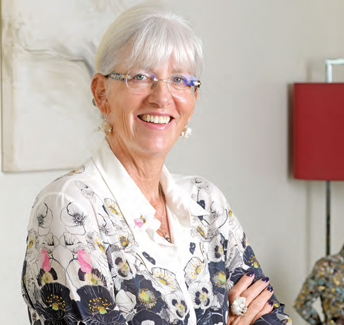
Petra Morhard: My first impression of India was when I first came to Mumbai. It was, of course, a lot of people, skyscrapers, and also close to the sea, so there was a lot of breeze. It seemed like a very busy city, with the entire hustle and bustle of traffic, mostly cars and on top of that, I arrived in the monsoons. Germans do not like the rain but it was compensated as we were very lucky to be so warmly welcomed and this I have to say is all about India. Indians are amazingly friendly people. We came from Sri Lanka and our friends there connected us to their friends here in Mumbai who checked us out a little bit and thereon, it snowballed into having so many good Indian friends from the beginning of six years throughout now. Just the hospitality and warmth, and wherever you go, people smile-that is so amazing. In some other countries it is very difficult to get eye-to-eye contact, but in India, it is so easy. It is the most lasting thing that I take home.
CC: You mentioned how your husband was posted in this region in Asia. Tell us about that.
In Asia, we started with Japan and stayed there for four years. Then we went to Germany, then to Africa and then came to Hong Kong for four years. After that, we were back to Germany and then to the USA. Thereafter, my husband was posted in Sri Lanka for four years and then it was his wish to go to Mumbai. So much so that he was supposed to go for another posting but he re-applied for this posting. For this, he had to go through the entire application process. We really wanted to stay in Mumbai and so he got his posting again until his retirement at the end of June 2022, after 35 years in service.
CC: Do you like Indian food?
We absolutely love Indian food and I especially love the various kinds of bread (rotis) and the thick sauces. My favourite food is Butter Chicken of course. However, I love all the Indian vegetarian dishes because you just don’t miss eating meat, as they are so flavourful with interesting sauces. You have some rice and bread with them, and it tastes amazing. We will miss it. We will take some spices with us and the tea which we have got addicted to. We drink two mugs of tea every day. We love it so much.
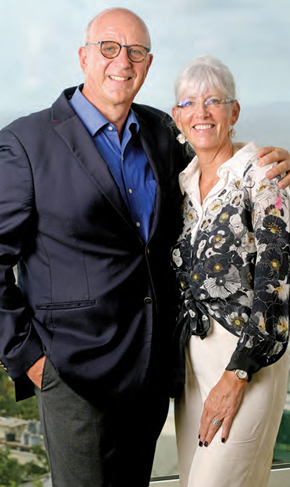
CC: You mentioned the domestic help that you get here...
We are very lucky that we have an amazing staff. They are like family members to us. Particularly, during the Covid-19 lockdown time, it was so amazing. How everybody helped and bonded with each other. We appreciate it very much. I appreciate my driver because he made Mumbai traffic very relaxed for me. In Germany, you are behind the wheel if you are stuck in the traffic and there is nothing much you can do. But in India, you have the luxury of having your driver who is driving your car and you are pretty relaxed. You can make a phone call to someone, or read a book-this is a big advantage. I will miss all these conveniences when I go back to my country.
In Germany, when the traffic comes to a standstill for long hours, it gets difficult to move. Here, in Mumbai, there is strangely, order in the chaos. Because all the traffic keeps moving, never mind if it is at a snail’s pace So, you always feel that there is something happening. It will take time but you will go somewhere.
CC: How long are you married? And what do you like most about your husband?
This year it will be 35 years. He is very kind, very curious, and full of energy, and I think he is the perfect man for the job he chose. Nothing to hate about him. We are looking forward to retirement because there are so many plans in the anvil. We will miss India; one of the plans is to come back here and visit Sri Lanka to visit friends.
CC: In India, young couples are breaking up and many marriages are on the rocks. What is it that keeps a marriage?
Respect the other person and ensure you truly love somebody you want as a spouse. Before entering marriage, you must truly feel comfortable should be ableto relate to the person. If things are truly disturbing between the couple, then it is very difficult to pull along. If you have respect and you admire your partner then you will live a wonderful life and create so many memories. In the beginning, you have to ensure you marry the person who is right for you. If you know a little bit about this person then it helps. Nowadays, it is easy to break up. You have to continuously strive to keep the marriage.
CC: How many children do you have? And what do they do?
I have two boys, they are in Berlin. One is working for an organisation and my younger one is a software coder.
The Driving Force
The affable and down-to-earth MD & CEO of Mercedes-Benz India Pvt Ltd, Martin Schwenk, can be crowned the Lord of Luxury Cars in India, as the Mercedes-Benz E-Class has attained the status of the best-selling luxury car in India, in FY22, outwitting other competing models in the similar segment, as per a 2022 study by the JATO Dynamics India, the premier automobile data organisation. Speaking at the FICCI FLO event, organised within the premises of the Mercedes-Benz plant in Pimpri-Chinchwad, Schwenk spoke at length about the journey of this esteemed company in India, the heritage and culture of this automobile giant, the status of the luxury car segment in India and innovative marketing strategies. Read on...
"When we talk about No. 1, it doesn’t mean that we want to be number one only in selling the most cars, it’s really also the expectation that we are the first to do things in this country. We were the first to bring performance cars. We have the largest base and we were the first to bring the segment into the country with Mercedes B-connect"
- Martin Schwenk,
"We are now in the transformation phase for the electrification of our vehicles. We are reinforcing and focusing massively on everything connected to high-tech vehicles. We are seeing a strong push in that area and we will also introduce moreelectric cars this year"
- Martin Schwenk,
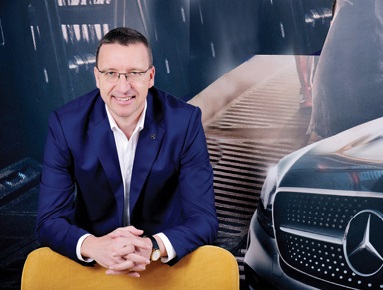
Journey of Mercedes-Benz in India
‘Almost 70 years ago, our association with India started with Tata Benz trucks and Tempo Travellers, and then in 1994, we started operations as Mercedes-Benz India. Before that, private people had imported cars on their own from Daimler Benz. There are many of our cars older than 27 years in the country but they weren’t produced or imported here by us. We set up our first shop in Chikhali in 1994. In 1996, we put up a large unit in Bengaluru focusing on IT and IT development. Around 7000 to 8000 people are presently working there, developing all types of technologies from engines to connected user interfaces, a lot of IT-related functions as well, which will be implemented in our cars.
‘Set up in 2009, our Mercedes-Benz India’s world-class production facility here in Chakan is spread over 100 acres. In June 2015, Mercedes-Benz India also commenced production from its new expanded production facility located in the same premises. The production facility now carries an investment of Rs.2,200 crores and has the largest installed production capacity for any luxury carmaker in India. This ultra-modern facility not only houses production but also sales and marketing functions. For the last two to three years, our financial services arm which was previously located in Chennai has also been moved here.
‘We have the heart of Mercedes-Benz in India right here in Pune. We have a beautiful and large facility which has an assembly unit, body shop, paint shop, and training academy for our dealers and our own staff. We have an SUV track which is a great adventurous experience that showcases the strength and tenacity of our vehicles. We introduced a crèche facility in 2018 so that mothers and fathers can bring their kids here. It was closed during the Covid-19 lockdown but now it’s open again. We still have a relatively low number of working mothers so that is a field on which we can further focus on. In this large high tech and modern facility, we have a strong footprint as regards our supply structure. We source components and parts locally whenever feasible. It is part of our strategy to localise wherever possible in our domestic production in India.

The heritage and culture of Mercedes-Benz
‘There is a lot of heritage, and you find that in many of our aspects. You find it not just in our cars but also in our culture and how we work together across the globe. We are now in the transformation phase for the electrification of our vehicles. We are reinforcing and focusing massively on everything connected to high-tech vehicles. We are seeing a strong push in that area and we will also introduce more electric cars this year. We have already introduced one from this factory in Chakan. We have a strong history and we are on our way to transforming into a strong future. What we can never lose sight of, is that it is always about not just providing the best product, it’s also about providing the best experience. Our forefathers had some say on that, and I believe we all have to adhere to that. We must have a clear focus on always pushing the boundaries. When it comes to product and doing business, when it comes to customer experience, our focus is always to be at the forefront of what is possible and what can be achieved.
"Quality is at the forefront of everything we do and it has the ultimate focus from everyone. When we set up a new product, we have reviews not only from external sources, we also have reviewers from Stuttgart. They send teams to review our production processes and they review our products before we can sell a single car"
Quality and Reliability
‘Quality is at the forefront of everything we do and it has the ultimate focus from everyone. When we set up a new product, we have reviews not only from external sources, we also have reviewers from Stuttgart. They send teams to review our production processes and they review our products before we can sell a single car. We have a detailed management around quality including complaint and issue management. Anytime there is a problem-and I can be honest in saying that customers sometimes face problems, unfortunately, I can assure you that we put every effort and give it full attention and try to resolve the problem as and when it occurs. The first priority is to avoid problems and issues with vehicles, but if they occur, we have strong processes in place to resolve them and hopefully get a happy customer as an outcome again.
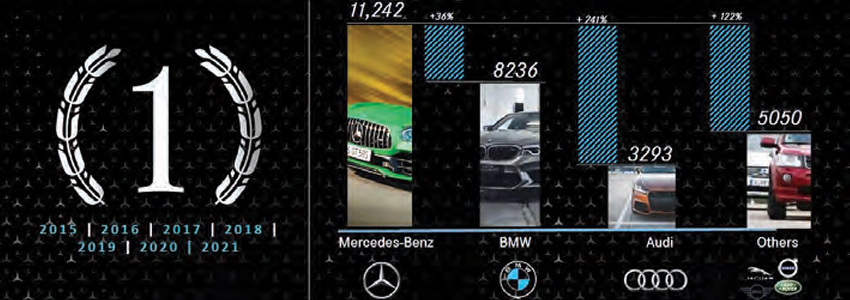 We continue to dominate the luxury car market in India for the 7th year!
We continue to dominate the luxury car market in India for the 7th year!
Mercedes-Benz’s product portfolio in India
‘We have 30 products made in this facility. In the meantime, 1.35 lakh cars on the road have come out from this factory. You may know some of them but when asked by a colleague in Germany which car we build at this plant, I told him that we build every car. For every car model that sells from 200 to 1000 cars a year, we consider it viable to start domestic production of that car. We build the As, Cs, Es, the S Class, we build the Maybach. We build the SUVs GLA, GLC, TLE, and TLS, practically the whole range is domestically produced. In that sense, we have a very strong product portfolio here. We also have an import range and we are the manufacturer that sells the most number of variants of any manufacturer in India. We might not sell the most cars but we have the widest variety of models available in the market. We also import around 25 models into the country.

The luxury car market scenario in India
‘I can really say that India is a very strong and good market but it hasn’t yielded yet for the luxury market. It is still not the size which we would want. Currently, you know that the market itself is basically dominated by Maruti Suzuki, and the luxury market share is only 1% of the passenger car market. If you do a comparison between many countries, you talk of 10-20% of vehicles being sold in that segment. We are far below that on the global scale, while on the other hand, we also have to acknowledge that our taxation and cost structures are relatively high, which creates a lot of hurdles for many customers and prevents us from achieving stronger growth. If the market is tough, you have to ensure that you must win what you can win, so I can say for the last seven years-and this is our eighth year-we have been able to stay ahead of the competition. We have sold way more than what our competitors could sell, so I think that is very important to us but it is also the vision and inspiration to stay ahead of what is happening.’
In an interview with Financial Express, Schwenk stated, “My simple ask is, why discriminate in terms of the length of a car? A car shorter than four metres is taxed differently compared to one that is longer, and then you add cess on the latter-the effective tax goes up from 28% to 45-50%. In a good year, we sell 15,000 cars across 12 models; we should be able to sell 30,000 cars with one model. Lower taxes can lead to more sales, more sales lead to more production, more production means more localisation, and that also means more exports”
Our innovative marketing strategies
‘I was talking about the product all this time. But it is not all about just the product. it is about having the right customer experience and when we talk about No. 1, it doesn’t mean that we want to be number one only in selling the most cars, it’s also the expectation that we are the first to do things in this country. We were the first to bring performance cars. We have the largest base and we were the first to bring the segment into the country with Mercedes B-connect. You might have heard of the change where we have moved from a dealer-based model to a franchise partner-based model. While the dealers were selling on their risk in the past, some six months ago, we transitioned it to the manufacturer. Whenever you go to buy a car from Mercedes-Benz, you go to the dealership, which is our franchise partner, but he will invoice on our behalf, so you are directly interacting with Mercedes-Benz India. It’s a direct sales model which has not been done in India. This has only previously been done in very few markets by very few brands.
‘Mercedes has three markets like this. This is something that creates a lot of transparency for the customer in terms of price. If you are buying in Pune or Mumbai, you will always get the same price and the same offer because the dealer is basically brokering what we are selling, so we have clear transparency about the price.
‘At the same time, there is also clear transparency on the availability of the products, and this is extremely important when there is a scarcity of supplies due to the disruption caused by the Covid pandemic. You will get the same car, the same offer, and the same price at any of our franchise partners. Earlier, maybe if there was a surplus of Red C-Classes in Mumbai and the dealer wanted to desperately sell them, and you were looking for a White C-Class, he would give you an offer or push you towards a Red C-Class. Today, he can see the entire inventory we are having at Mercedes-Benz India and if we are having a White C-Class anywhere, he can book that car for the customer, no matter which franchise the car is currently located in, or which city. In that sense, this model is very forward-looking. This is a complete shift in the auto industry but it also documents the aspirations we have at Mercedes-Benz India. We were one of the first ones to do good things, but going forward we can be the first ones to do the best things.
‘We also have the strongest service network of all the luxury brands. In total, we are in around 50 cities in India. We have 94 outlets between sales and customer service. It’s quite a comprehensive network.
"We have the heart of Mercedes-Benz in India right here in Pune. We have a beautiful and large facility which has an assembly unit, body shop, paint shop, and training academy for our dealers and our staff. We have an SUV track which is a great adventurous experience that showcases the strength and tenacity of our vehicles"
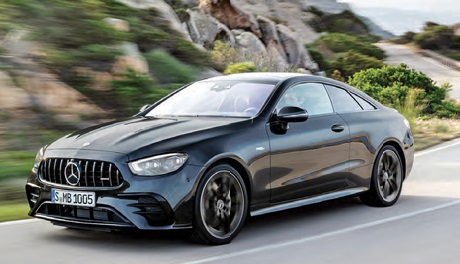 Mercedes-Benz E-Class
Mercedes-Benz E-Class
Our CSR and Sustainability activities
‘Coming to business topics, let’s talk about sustainability, which has now become the core of any brand, and especially a luxury brand like Mercedes-Benz, to do business. Product generation, product development, the second life of parts and components, re-usability and recyclability of products are all a part of our strategy. It’s about people, it’s about the planet and planet preservation. It’s about a cleaner future. There are a lot of things we do; there are hundreds of plant species at our plant, which are grown and specially managed. We have water waste management in place. We have 3.6 MW of solar panels on some of the roofs. We are also considering ourselves a clean factory. We are driving forward in a lot of aspects of sustainability.
‘As a big corporate house, we have a lot of responsibility when it comes to difficult times, not just during the normal times where we have our regular CSR activities, but also during events like we have seen in the past two years. We have been supporting many measures around Covid relief here in Pune. Like everyone, I hope these times don’t come back, but I must also say that the Mercedes Team was fully involved in doing what could be done to contribute.
Women employees
‘I am not 100% certain I can quote the exact percentage of women with us. This field here is the production area, and in the production field, there are very few women. On the assembly line, we have almost no women; in the sales department, we have a significantly higher proportion of women. Similarly so in finance and other traditional fields. Frankly speaking, we have to catch up in these areas. I am happy with your question but I would like you to ask me that question a year from now again because this is an aspect which has been unfortunately on the backburner in the last two-three years where we were busy with other things. I personally believe it’s extremely important to work on increasing women’s participation. It definitely needs more effort and more focus in that area.
Mercedes-Benz cars for Indian roads
‘I would say this is a question that goes more to the roads than to the car. Unfortunately, it depends on the road itself. Technically, all our cars are roadworthy on the Indian roads. They don’t have any inherent trouble. But I will be honest, if you drive some sedan and hit a high-speed bump, there could be a problem from time to time-we do see some scraping. This is why we are seeing more and more customers moving to our SUV range. In SUVs, the risk of scraping is basically non-existent. Our sedans are also doing quite fine on the roads, but of course, I would prefer the roads to be a bit better than they are at the moment.’